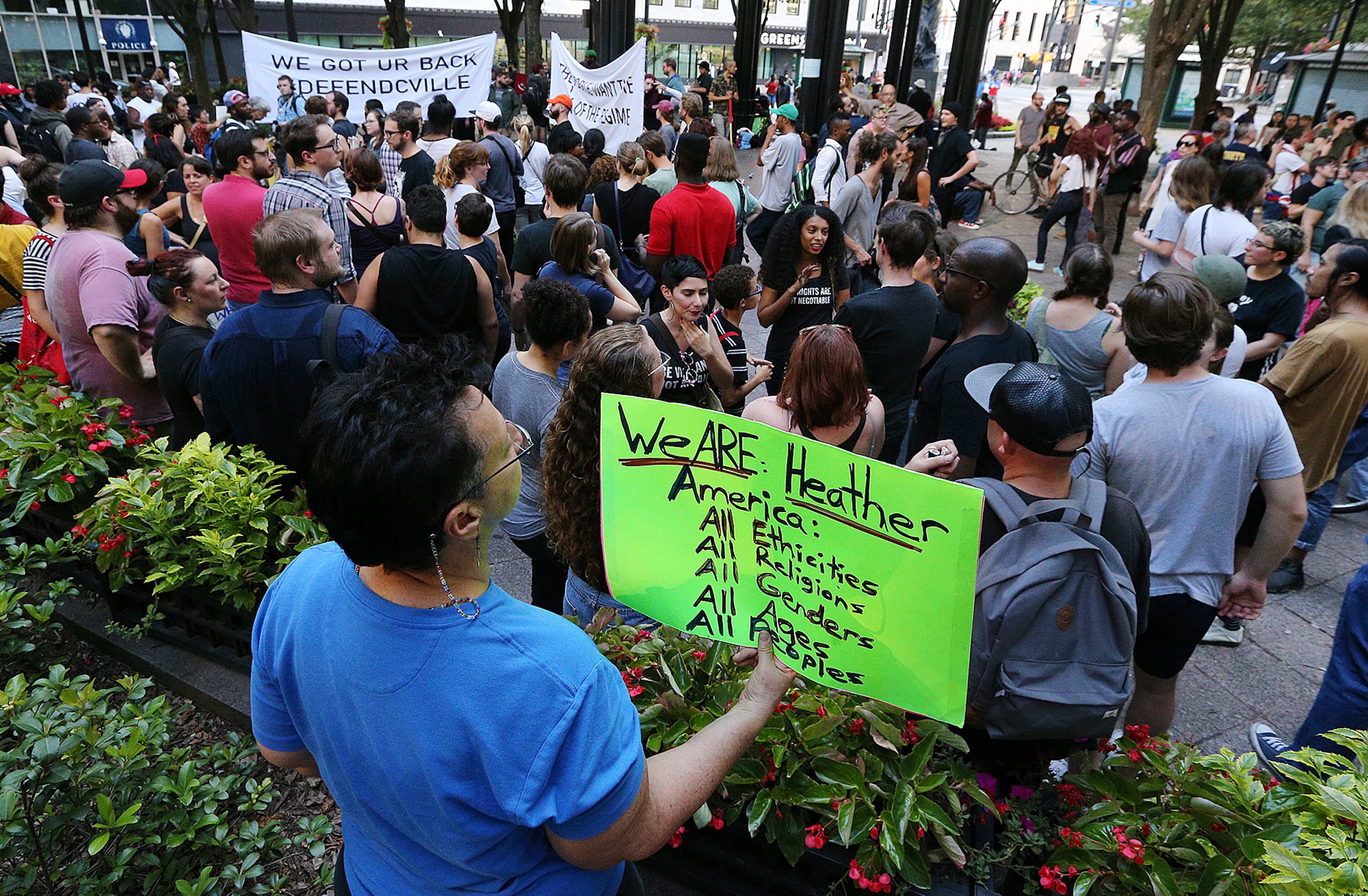
From the pulpits to the pavements, reaction to the tragedy in Charlottesville ran the gamut Sunday across metro Atlanta.
Some called for unity and reconciliation, while others angrily urged defiance as they condemned white supremacists who gathered in Virginia for the “Unite the Right” rally. Saturday’s event in Charlottesville turned violent and then deadly when a far right sympathizer from Ohio drove his car into a group of counter-demonstrators, killing a 32-year-old woman and injuring 19 others, police said.
>> Who is James Alex Fields Jr., suspect in deadly Charlottesville car attack?
At a downtown rally Sunday night organized by All-Out Atlanta, a group affiliated with the militant anti-fascist “antifa” movement, protesters took to the streets.
They marched to Piedmont Park, where some climbed and spray painted the Peace Monument, which depicts a Confederate soldier after the Civil War. There were almost no police on hand.
Tensions rose as the lone policeman on the scene was surrounded by black-clad antifa protesters shouting “pig.” Black Lives Matter protesters put themselves between the police officer and the antifacism crowd.
The gathering soon dispersed.
“It’s clear now. Love doesn’t trump hate,” said Amario Garcia, who served as the emcee of the protest, which attracted hundreds and included an unsanctioned march down Peachtree Street, stopping traffic along the way.
“Love doesn’t stop bullets. Love doesn’t stop moving cars. … No one is going to defend us but us,” Garcia said. It was a message echoed by many who spoke out.
In Decatur, a similar sized crowd of progressives offered a more somber take, bowing their heads in a moment of silence for Charlottesville and a world divided while calling for unity against white supremacy.
But while their methods differed, there was near-unanimity against President Donald Trump, who drew widespread criticism from both political parties Saturday after failing to specifically decry the role of white supremacists in the Charlottesville tragedy.

“Why won’t the president speak out against white supremacy?” Rev. Shanan Jones told a receptive congregation at Ebenezer Baptist Church. “The problem is that the white supremacists that were there mirror the white supremacists that are in the White House.”
At Ebenezer, attendees who were interviewed after the service said they approved of Rev. Jones’ blunt response.
“It needed to be said,” said Linden Coper, 25. “The most important person who should be saying it” — by which he meant the president — “isn’t saying it.”
Edgar Flint, 76, said airing the unabashed truth is the only way to heal, and to him it was clear “white supremacists” were at the root of the Charlottesville violence and needed to be called out. “I don’t think the president said enough,” Flint said. “It seemed like he was playing to a particular group of people.”
“When Obama was president, (Trump) was always on him for not saying ‘Islamic terrorists,” Flint added. “But he can’t say this now?”
Other pastors said church can’t be silent on issues of race.
To those who say we should not give attention to the racists and bigots, The Rev. Bill Britt of Peachtree Road United Methodist Church, suggested it is the church’s duty to speak out and be clear on its position. “I’m afraid our silence would be misinterpreted,” he said.
The Rev. Timothy McDonald, the longtime preacher at First Iconium Baptist Church, said it was pastors’ duty to be specific about sin.
“Racism is a moral issue,” McDonald said after delivering his sermon. “The church has a responsibility here. I talked about the silence of the church as well. The deafening silence of the church.”
On the streets of Atlanta, the antifa protesters were loud and unsparing, chanting obscenities aimed at Trump and America.

“We have a duty to fight back,” said Dawn O’Neal, of Atlanta. “When tyranny is law revolution is justified.
The crowd headed towards Piedmont Park, where a heavy police presence was waiting. Although there was some concern about violence from a small band of anarchists who participated in the march, Atlanta mayoral candidate Vincent Fort said they weren’t the ones to fear.
“They are mainly suburban white kids who don’t have any connection to the African-American community,” Fort said. “I’m much more worried about the white supremacists and Nazis.”
Back in Decatur, local activist Meymoona Freeman led a call and response chant that captured the contrasting mood of the two protests.
“I will support those of all religions and faiths,” she said, and the crowd shouted it back.
They chanted for the respect of anyone they felt is oppressed, including “The poor. The disabled. The gay. The homeless.”
Yards away, a Confederate monument stood behind the historic courthouse.
“I don’t care if there’s some monument,” Freeman announced to the crowd. “We made this square different.”
White candle wax dripped from people’s hands as they bowed their heads.
“It’s a disgrace,” attendee Dan Vogel said of the events in Charlottesville. “I think people need to stand up and say that. It shouldn’t be happening in 2017.”
Vogel was standing with Helena Herring, who held a sign calling for an end to white supremacy. As a white woman, she said she benefits from it.
“And we have to stand up and fight it,” she said.
Staff writer Joshua Sharpe contributed to this report.




